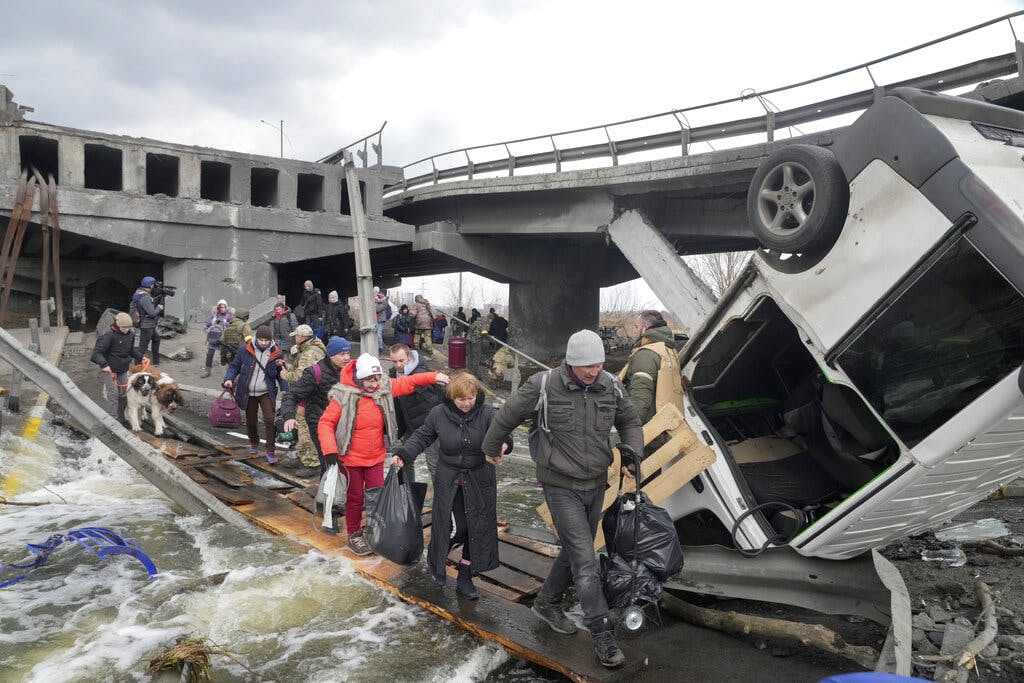Putin’s War Heats Up, With Mariupol Pummeled, Odessa Girding for Attack
While Russian negotiators said a fourth round of talks could be announced as soon as tomorrow, by all accounts President Putin is more on the warpath than ever.

ATHENS — Russia’s unrelenting air and artillery bombardment of several cities in Ukraine points to Vladimir Putin’s no. 1 priority: crushing the Ukrainian resistance and seizing control of the country by any means he deems necessary.
A third round of talks between Kiev and Moscow ended today without a ceasefire, though an advisor to President Zelensky, Mykhailo Podoliyak, tweeted that there had been “some progress on improving the logistics of humanitarian corridors” for evacuees from some of the cities under fire.
While Russian negotiators said a fourth round of talks could be announced as soon as tomorrow, by all accounts President Putin is more on the warpath than ever.
Sky News reported Monday that Russian air strikes killed at least 13 at a bread factory near Kiev and there was heavy shelling at Mykolayiv, a port city situated strategically between Kherson — which the Russians have already captured — and Odessa.
Ukrainian forces had retaken the regional airport in Mykolayiv, as well as the town of Chuhuiv, outside the much larger Kharkiv, which has in recent days been under periodic rocket fire that has caused multiple casualties, children among them.
Radio Free Europe reported that Russian forces shot and killed the mayor of Hostomel, Yuriy Prylypko, as well as two of his associates, citing a Facebook post from the town council. According to that post, the mayor was distributing bread to residents at the time of the attack, the exact circumstances of which were not made immediately clear.
Mariupol, the big city strategically situated on the north coast of the Sea of Avov, is being subjected to what a defense and security analyst for Britain’s Sky News, Michael Clarke, termed today “old-fashioned siege warfare.” AP reports that an estimated 200,000 people were hoping to flee, and Red Cross officials waited to hear when a corridor would be established.
Hospitals in Mariupol are facing desperate shortages of antibiotics and painkillers, and doctors performed some emergency procedures without them. The city is short on water, food, and power. Greek newspapers reported earlier in the day that the Greek consulate may have been hit by rocket fire, though that could not be confirmed. The Greek consul was reported to have sought refuge in a bomb shelter.
Russia also has the key Black Sea port city of Odessa firmly in its sights, as this and other newspapers have reported. With a naval assault task group of some 30 war ships already lurking offshore, Moscow clearly has the upper hand in any amphibious assault — particularly if the much-discussed possibility of getting fighter jets to Ukraine via Poland doesn’t pan out.
Time will tell, but mounting tensions will only be exacerbated by late-breaking accounts, still unconfirmed, of a Ukrainian hit on a Russian ship. A spokesman for the Operational Headquarters of the Odessa Regional Military Administration, Serhiy Bratchuk, made the claim in a Facebook post.
In a sign that Odessa is girding for attack — despite some U.S. assessments that a Russian onslaught is not imminent, Greece has just evacuated several of its nationals from the city. Kathimerini reports that “Operation Nostos 5” resulted in the successful evacuation of 34 people, including 25 sailors employed by a Greek-owned shipping company, to Moldova from Odessa, accompanied by the Greek consul general to Odessa, Dimitrios Dochtsis.
Another Greek daily newspaper, Ta Nea, runs a story about “Alexis,” a 46-year-old Greek expatriate fighting on the frontline just northwest of Kiev. The married father of two will fight to protect his home, which is less than 2,000 feet from land that has become a battlefield. “I am sorry for what is happening in my state,” the report says he told the correspondent of Greece’s Mega channel. “I see people being killed. I see children being killed. How did the Russians come and do this? The only thing they have more than us is how many came. There are many,” he said, adding that he believes Russian tanks will be advancing toward Kiev soon.
In the meantime, London’s Spectator asks if a Kremlin assassin might get to Mr. Putin, and posits that while the chances don’t look good given the raging Russ’s airtight 24/7 security detail, he has given would-be assassins ample fodder by having “publicly humiliated members of his inner circle by berating them when they have raised the mildest of questions about his actions.” While military analysts are busy poring over Moscow’s anticipated next moves on the battlefront, Russia-watchers have been on alert for any signs of dissent within Kremlin walls. One such is Farida Rustamova, an independent journalist formerly with BBC’s Russian service, who reports that an insider source says many in the corridors of power in Moscow are “in a state of near-paralysis.” Also, this nugget: Ms. Rustamova notes that during the now infamous televised meeting of the Russian Security Council, which took place three days before the war began, Mr. Putin said practically nothing about his decision to recognize the Donetsk and Luhansk “people’s republics,” she quotes a source as saying. She writes that the session itself was an attempt at improvisation, to present the image of a real discussion and that is why, her source says, “everyone there was fidgeting so much.”

